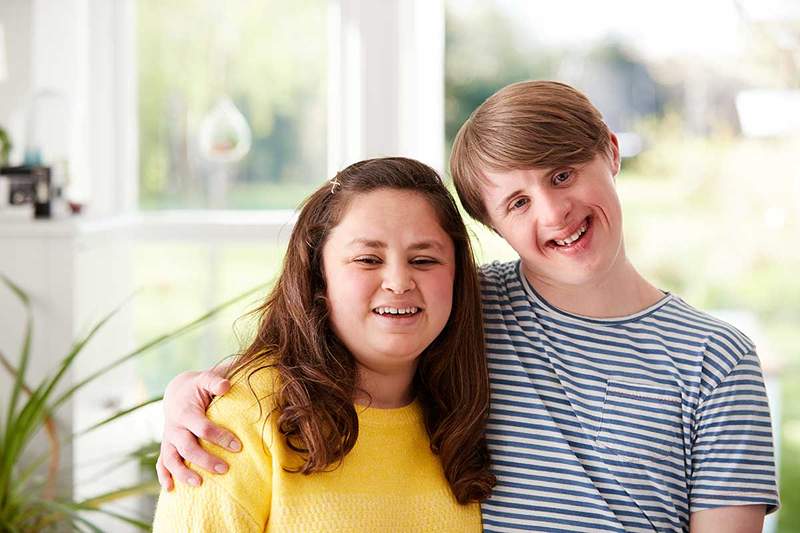Disability, Down and Sexuality Syndrome

- 4106
- 328
- Austin Stokes
"No one is disabled enough to not be able to enjoy the wonder of love, the tenderness of a kiss, sexuality and any of its variants and manifestations". José Julián Castillo
Sexuality constitutes a topic of interest for all. At present, scientists address their study in a multifaceted way, from the various scientific disciplines and from the respective philosophical positions.
However, you always have to keep in mind that it is a human fact inherent in a person with biological, psychological and sociocultural characteristics, with a personal, family, social history and with a specific development of your personality.
There are different definitions that aim to conceive it as a very important phenomenon in the life of the human being, most can be summarized in the one raised by the World Association for Sexual Health:
Content
Toggle- What is sexuality
- Sexuality and disability
- Characteristics of people with Down Syndrome
- References
- Authors
What is sexuality
- It is a human construction.
- It is the result of the interaction of factors: biological, psychological, cultural, socioeconomic, cultural, ethical and religious or spiritual.
- The identities and papers of gender, sexual orientation, eroticism, pleasure, intimacy and reproduction cover sex.
- It is experienced and express in the form of: thoughts, fantasies, desires, beliefs, attitudes, values, behaviors, practices, functions and relationships.
- The construction of sexuality, is one of the determining factors of sexual health, of the human sexual response, of the ability to emotionally link, of the choice of reproduction, of self -esteem, self -image, sexual orientation and eroticism.
Sexuality permeates and clarifies the most diverse spheres for what is studied in its harmonious integration with personality, attributing an unquestionable role in the social system. It is not an immovable, but dynamic process, which is manifested and expressed in each stage of life in a different way.
Sexuality and disability
In relation to it, there are many Stereotypes, myths and prejudices and especially about people with disabilities; But it is important to internalize that There is no unique sexuality, Common and ideal, there are as many as people exist and therefore each individual expresses it and lives it in a very particular way.
Several authors refer that sexuality has been considered as something of adults and aimed at procreation, thus creating a barrier that limits the sexual development of these people.
The sexuality of people with disabilities is not different from that of the rest of the people and the apparent differences or meanings given to this issue have been created by society itself, so their education and guidance must be based on the same principles.
There is no doubt that the sexual life of people with disabilities has certain specificities, either because of the conditions or ways in which they can live it, which influences each family and social context, like the rest of the people.
WHO considers that a disability is any restriction or absence (due to a deficiency) of the ability to perform an activity in the form or margin that is considered normal for a human being.
 Effects of abusive porn consumption
Effects of abusive porn consumption Characteristics of people with Down Syndrome
Individuals diagnosed as Down syndrome are considered people with disabilities. Down syndrome occurs when an individual It has a total or partial extra copy of chromosome 21. This additional genetic material alters the course of development and causes the characteristics associated with Down syndrome. Some of the physical features they present are: low muscle tone and height, an upward inclination and a single deep fold through the center of La Palma. However, each person with Down syndrome is a unique individual and can possess these characteristics in different or not degrees.
John Langdon Down described people with Down syndrome as people with "Ease for imitative humor, mimicry, with musical and stubborn skills”, Attributes that have been incorporated into the set of common characteristics between them generating to this day stereotypes that accentuate the myths that exist; They are described as stubborn, affectionate, easy to treat, affectionate or sociable, cheerful obedient or submissive.
People with Down syndrome have effects on the cognitive sphere As a slowness to process, codify, interpret and develop information, in addition to difficulties in space -time orientation, they have a significant delay of the language, it is difficult for them to give verbal answers and capture information, it is important that they have a better level of comprehensive language than expressive, although everything depends of the stimulation you receive.
In relation to the sexual sphere, it is proposed that Down's syndromes experience the same sequence of physical and hormonal changes associated with puberty just like others of your age. What is sometimes a delay in the development of maturity and social communication and emotional self -control.
This manifests the hormonal disorders of adolescence, which includes the attempt to establish their own identity, privacy search and satisfaction of their own interests, an aspect that is frustrated by overprotection or rejection that they are subjected to in their environment.
We can say that There are no significant differences in relation to sexual biological development, What exist are factors that determine the satisfaction of their affective and sexual needs that place them within a group of greater vulnerability for sexual abuse, including: the difficulties of accessing normalized contexts, overprotection, the absence of spaces and private and intimate times within a Little stimulating and controlled environment, the denial of sex education.
Down's syndromes have, feel and experience their sexuality. They are people with dignity who require support and accompaniment to be carried out as human beings and live in the fullest way possible. Professionals and parents must capture their needs and desires in all areas, including sexual, so that, they can be heard, attended and, as far as possible, satisfied. The common objective is that they become adults and integrate into society and can live, enjoy and fulfill their rights and duties, within them: the receive sex education, form a couple and have a full sex life, So carrying out projects in this regard is essential for its harmonic development.
Down syndrome, what is, causes, diagnosis and treatment
References
- Pan American Health Organization, World Health Organization. Montreal declaration on intellectual disability. http: // www.MMONTREAL DECLARATION.com/docs/declaration_espanol.PDF
- Santander, l., Alzate, l., Isaza, m. Project for the prevention of sexual abuse of child and adolescents in the "Integration Support" program at the Integrar 2007 Foundation. CES University, Faculty in Psychology, Medellín. Retrieved on February 8, 2012: http: // bdigital.CES.Edu.CO: 8080/DSPACE/BITSTREAM/123456789/163/1/PROJECT_PREVENCION_ABUSO_SEXUAL.PDF
- CASTILLO J. J. The paths of pleasure. Havana: Editorial Cenesex. 2011, p. twenty.
- Egea c. and Sarabia a. WHO classifications about disability. http: // www.um.is/discatif/methodology/egea-sarabia_clasifications.PDF).
- Julián Pérez Porto and María Merino. Posted: 2008. Updated: 2012.
- Definitions: Down syndrome definition (http: // definition.of/Syndrome-Down/)
- Egea c. and Sarabia a. WHO classifications about disability. http: // www.um.is/discatif/methodology/egea-sarabia_clasifications.PDF).
Authors
- Lic. In Psychology Ana Bethania González Lugo. Email: [email protects]
- MSC in Clear Clinical Sexology of the C. Lugo López.
- JUAN CARLOS MARRERO GARCÍA. Email: [email protects]
- Nancy of the C. Lugo López. Email: [email protects]
- Carlos Rafael González Lugo
- « SORDER AND AUBISM IS CONFUSED? Alerts at diagnosis time
- What is verbal dispraxia or apraxia and how it manifests »

